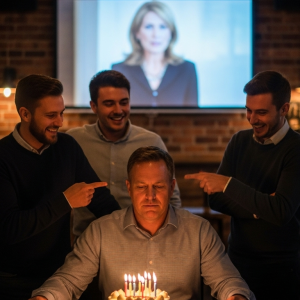I never planned on sharing this story online. But after seeing a few similar posts, I figured writing it all out might be therapeutic. Maybe someone else going through a tough time with their family might get something out of it. I don’t know. Anyway, here it goes.
My name is Brady. I’m twenty-six now, but this story starts when I was seventeen, a junior in high school. I was never the perfect son my parents wanted. My dad worked at a manufacturing plant, and my mom was a receptionist. We weren’t rich, but we were comfortable enough in our smallish town. They had this whole life mapped out for me: get good grades, go to State University like my dad did, marry some nice girl from our neighborhood, have 2.5 kids, and live out their version of the American dream.
The only problem was, I hated school. Not because I was dumb—I got decent grades when I tried—but I have ADHD, though I wasn’t diagnosed until much later. Sitting still for hours, listening to teachers drone on about subjects I didn’t care about, was literal torture. What I did love was working with my hands. Building things. Fixing them. When I was fifteen, I spent a whole summer helping our neighbor, Judah, renovate his garage. It was the first time I felt like I was actually good at something.
My parents hated it. Every time I talked about going into construction or learning a trade, my mom would get this pinched look on her face, like I’d just announced my ambition to become a professional dumpster diver. My dad would lecture me about “living up to my potential” and how “people like us don’t work with their hands.” Looking back, I think they were just obsessed with appearances. They wanted to brag about their son, the college graduate, not their son, the blue-collar worker.
Things had been tense for months. I was working part-time at a local hardware store, saving up money because something in my gut told me I might need it. My grades were slipping because, honestly, I just stopped caring. Every dinner turned into an argument about college applications, my future, or why I was “throwing my life away.”
The breaking point came in April, about six weeks before graduation. I’d been accepted to State—my parents had practically filled out the application for me—but I’d also been looking into a trade program for construction. It was cheaper, shorter, and taught skills I was actually interested in. I’d gotten in, and they were even offering a partial scholarship based on a portfolio of projects I’d put together. I decided to tell my parents over dinner.
Bad idea.
As soon as I mentioned “trade school,” my dad threw his fork down so hard it bounced off his plate with a sharp clatter. My mom started crying. Actually crying, like I’d just told her I had six months to live. What followed was the worst fight we’d ever had.
“Ungrateful!” my dad roared, his face turning a blotchy red. “After everything we’ve done for you, you spit in our faces!”
“Where did we go wrong, Brady?” my mom sobbed into her napkin. “We just want what’s best for you.”
“This is what’s best for me!” I shot back, my own voice rising. “It’s something I’m passionate about! Something I’m good at!”
When I tried to explain how excited I was about the program, my dad cut me off with words that would echo in my mind for years. “No son of mine is going to waste his life banging nails. If you’re too stupid to see the opportunity you’re throwing away, then maybe you’re not the son we thought you were.”
Something inside me snapped. “I’m sick of living my life to fulfill your dreams! I’m almost an adult, and I can make my own choices! You never actually listen to what I want!”
We were all yelling now. It got ugly. I said things I’m not proud of. They said worse. Finally, my dad stood up, his chair scraping against the floor. “If you’re not going to follow our rules and our plan, you can get out of our house.”
I think he expected me to back down. I didn’t.
I went upstairs, grabbed the emergency bag I’d already packed—told you I had a feeling—and stuffed in as many clothes as I could fit. I grabbed my laptop, the cash I’d been saving (about $1,200), and my important documents. When I came downstairs with my bags, my parents looked shocked, like they couldn’t believe I was actually calling their bluff.
My mom started in with, “You’re making a huge mistake, Brady. You think you know everything at seventeen.”
My dad just stood by the door, his arms crossed, a stony expression on his face. As I walked out, my mom called after me, her voice laced with a cruel certainty.
“You’ll be back begging in a month! You have no idea how hard the real world is!” She had this smirk on her face, and it broke something inside me.
My dad didn’t even look at me. He just slammed the door as soon as I was out.
I stood on our front lawn for a minute, numb. It was starting to rain, which felt appropriate. I remember thinking, Well, this is some movie-level dramatic stuff happening right now. Then, I called my friend Corey, whose parents were actually decent humans.
Those first few days were a blur. Corey’s parents let me crash on their couch, but I knew it couldn’t be permanent. I was still trying to graduate while figuring out where I was going to live, how I was going to eat, and basically how to become an adult overnight. I kept having these moments where I’d suddenly realize, I’m homeless. Panic attacks became a regular occurrence in the school bathroom. But one thing kept me going: pure, stubborn anger. There was no way in hell I was going to prove my parents right by crawling back.
About three weeks after I left, my mom texted me. Not to apologize, not to ask if I was okay, but to say: When you’re ready to apologize and accept our help (with our conditions), you can come home.
I didn’t respond. A week later, my dad left a voicemail saying pretty much the same thing. They were so sure I’d fail, just waiting for me to come crawling back so they could say, “I told you so.”
I graduated high school while living on Corey’s couch. My parents came to the ceremony—keeping up appearances, I guess. They tried to talk to me afterward, but I just walked away. I had nothing to say.
By June, I’d saved enough to get a shabby apartment with two other guys. One was Marcus, who worked nights, and the other was Tyler, who I’m pretty sure was dealing something but minded his own business. The place had roaches that would practically wave at you, but it was mine. One-third mine, anyway. No one could kick me out.
I enrolled in that trade program, using my scholarship and working almost full-time to pay for it. It was exhausting. But every time I wanted to give up, I’d remember my mom’s smirk and my dad’s slammed door, and I’d find the energy to keep going.
Around the six-month mark, my parents changed tactics. My mom started texting that she missed me. My dad sent a message saying they were “willing to compromise” on my education if I moved back home. It just made me angry all over again. They seriously expected me to give up the independence I had fought so hard for, just because they were now allowing me to make some of my own choices? Hard pass.
By the time I was twenty, my mom showed up at my apartment unannounced. I almost didn’t recognize her. She looked older, smaller. It was awkward. She looked around my place with an expression that wasn’t quite disgust, but definitely judgment. Then she got to the real reason for her visit: my dad had been passed over for a promotion, and they were struggling financially. She wanted to know if I could “help out.”
The audacity made me laugh. Two years after throwing me out, they wanted my help. I told her I couldn’t. She left, looking annoyed, like I’d failed some test. She didn’t even say she was proud of me for making it on my own.
By twenty-one, I was doing well enough to get my own place. Just a small one-bedroom, but it was all mine. The day I moved in, I sat on my secondhand couch and cried. I never thought I’d get this far. Around this time, I met Lydia. She needed some repairs done in her apartment, and my mentor, Santiago, sent me. She was smart, funny, and didn’t take any of my nonsense. We started dating, and for the first time, I let someone really know me—all the baggage with my family. Instead of running, she understood.
When my parents heard I was serious about someone, they suddenly got very interested again. They wanted to meet her, to play happy families. I kept them at arm’s length. Lydia deserved better than to be dragged into their mind games. Four years after being kicked out, I had a stable life, a healthy relationship, and a future I was building myself. But the story doesn’t end there. Just when I thought I’d finally moved beyond their shadow, things were about to get complicated.
By the time I was twenty-four, life had settled into a comfortable rhythm. I was working with Santiago full-time, building a solid reputation. Lydia and I were serious, even talking about moving in together. I was happy.
Then came the Facebook post that changed everything. My mom wrote a long, dramatic post about “hard times” and “trusting God’s plan” during unemployment. It was an obvious fishing expedition for sympathy. The comment section was full of prayers and support. But it was the last paragraph that made me choke on my coffee:
We’re so blessed to have our son, Brady, supporting us through this trial. Family truly is everything.
I hadn’t given them a dime. She was publicly announcing I was supporting them, creating a social pressure cooker to force my hand. I called her immediately. She acted surprised by my anger, claiming she was just expressing gratitude for my “emotional support.” I knew exactly what she was doing.
I made a decision. I texted my mom that I wouldn’t be providing financial support. I told her what they were going through was tough, but I was still building my own life, still recovering from being thrown out as a teenager. I even suggested some local resources for job seekers—the same ones I’d had to use years ago.
Her response was a single, cold, “Okay.”
Then, silence. For three weeks. Until yesterday. My phone exploded with notifications. Texts, calls, voicemails—all from my parents and various relatives. Apparently, their financial situation had gone from bad to worse. They were facing foreclosure. And somehow, this had all become my problem to solve. My aunt left a voicemail saying I needed to “step up and be the man your father raised you to be.” The irony made me laugh out loud.
The roles had completely reversed. Nine years ago, they thought I couldn’t survive a month without them. Now, they were the ones who couldn’t manage without me.
I agreed to meet them. Alone. At a coffee shop—neutral territory. The day before the meeting, however, the calls became frantic. My mom, my aunt, my cousin. When I finally answered, my mom was sobbing. Dad had been laid off again. They were months behind on the mortgage and had just received an eviction notice. They had two weeks.
I felt… annoyed. Annoyed that after nine years, they were still expecting me to drop everything and rescue them.
The next morning, I drove to their house. It looked smaller, shabbier. The paint was peeling, the lawn overgrown. It was a physical manifestation of their decline. My dad answered the door. He’d aged so much, his shoulders permanently stooped. My mom was at the kitchen table, her eyes red.
“Thank God you’re here,” she started. “We knew you’d help.”
“Sit down,” I said, my voice firmer than I expected. “For once, I’m going to talk, and you’re going to listen.”
I laid it all out. The night they threw me out. The prediction I’d come crawling back. The years of conditional contact. The total lack of a genuine apology. My dad tried to interrupt with excuses—”we were doing what we thought was best”—but I held up my hand and kept going. I told them about sleeping on couches, working two jobs, crying myself to sleep from loneliness.
“Where was this ‘family sticks together’ attitude when I was seventeen and homeless?” I asked, my voice shaking with a decade of suppressed anger. “You only seem to remember we’re family when you need my help.”
The conversation went in circles until I finally laid out my terms. One, I would help them avoid foreclosure this one time, but they had to downsize. Two, they had to take down that manipulative Facebook post. Three, if they wanted any relationship with me moving forward, we would all start therapy together to establish honest communication. Four, they had to understand that my life, my choices, were mine to make.
I expected arguments. Instead, my dad just looked defeated. My mom looked between us, waiting for him to fix it. Finally, they agreed.
I wrote them a check on the spot. Not because I owed them, but because I wanted to close that chapter on my own terms.
As I was leaving, my dad followed me to the porch. For a second, I thought he was going to try one last guilt trip. Instead, he said something that caught me off guard.
“You turned out all right,” he said, not quite looking at me. “Better than all right. Not how I pictured, but… you did good.”
It wasn’t a full apology. It wasn’t even close to making up for everything. But it was possibly the first genuine thing he’d said to me in years. I stood there on the same porch where he’d slammed the door in my face nine years ago.
Finally, I just said, “I know.” And walked to my car.
I don’t know if we’ll ever have a normal relationship. There’s too much water under that bridge. But at least now, we’re building something based on reality, not manipulation. What I do know is this: that scared seventeen-year-old kid, standing in the rain with nowhere to go? He did all right for himself. He built a life on his own terms and found people who love him unconditionally. And eventually, he stopped letting his parents’ rejection define him.




